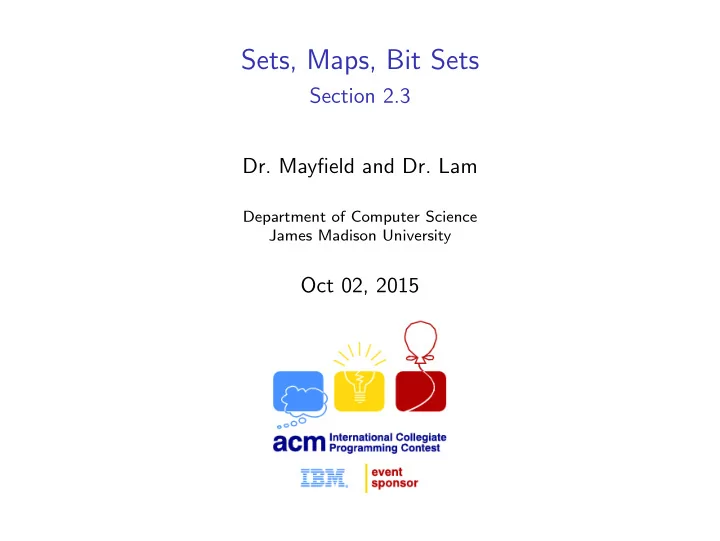

Sets, Maps, Bit Sets Section 2.3 Dr. Mayfield and Dr. Lam Department of Computer Science James Madison University Oct 02, 2015
C/C++ pointers For those unfamiliar with pointers . . . int i; // integer int *p; // integer pointer p = &i; // & is the reference operator *p = 74; // * is the dereference operator cout << i << endl; // prints the value 74 Binky Pointer Fun Video: http://cslibrary.stanford.edu/104/ Pointers to objects use the -> operator ◮ In C++, foo->bar is equivalent to (*foo).bar ◮ Since Java has no pointers, it simply uses dot Oct 02, 2015 Sets, Maps, Bit Sets 2 of 15
Reality Check Pointers make it possible to allocate new memory! Oct 02, 2015 Sets, Maps, Bit Sets 3 of 15
Stack vs heap allocation int main() { string s1("Hello"); // constructor cout << s1.length(); } ◮ Local variables are allocated on the stack ◮ When functions return, objects are destructed int main() // notice use of new and -> { string *s1 = new string("Hello"); cout << s1->length(); } ◮ Pointers are simply integers (allocated on the stack) ◮ The objects they point to are allocated in the heap Oct 02, 2015 Sets, Maps, Bit Sets 4 of 15
C++ iterators Iterators are a generalization of pointers ◮ They must implement * (dereference) ◮ They must implement ++ (i.e., get next) // example from last week vector<int>::iterator iter; for (iter = v.begin(); iter != v.end(); iter++) cout << *iter << endl; SPOILER ALERT! ◮ Not all data structures are linear (like arrays) ◮ But you don’t have to worry about that issue Oct 02, 2015 Sets, Maps, Bit Sets 5 of 15
Non-Linear Data Structures When making an array for every possible item would be insane. Oct 02, 2015 Sets, Maps, Bit Sets 6 of 15
What’s a set? (C++) Unordered collection of objects ◮ Set of vowels V = { a , e , i , o , u } Hint for UVa 11849: Compact Discs set<int> nums; nums.insert(74); nums.insert(78); nums.insert(82); nums.insert(74); // no new element inserted set<int>::iterator iter; iter = nums.find(82); // find returns nums.end() if not found http://www.cplusplus.com/reference/set/set/ Oct 02, 2015 Sets, Maps, Bit Sets 7 of 15
What’s a set? (Java) Unordered collection of objects ◮ Set of vowels V = { a , e , i , o , u } Hint for UVa 11849: Compact Discs // must use reference types like Integer Set<Integer> nums = new HashSet<Integer>(); nums.add(74); nums.add(78); nums.add(82); nums.add(74); // no new element inserted nums.contains(82); // returns true or false https://docs.oracle.com/javase/7/docs/api/java/util/Set.html Oct 02, 2015 Sets, Maps, Bit Sets 8 of 15
Binary search tree Internal data structure for STL set , map (Java TreeSet , TreeMap ) Oct 02, 2015 Sets, Maps, Bit Sets 9 of 15
What’s a map? Data structure of (key, value) pairs ◮ No two entries have the same key ◮ Allows you to store additional data ◮ Implemented with trees or hashing Applications ◮ Dictionaries ◮ Counting problems ◮ Lots of others! Oct 02, 2015 Sets, Maps, Bit Sets 10 of 15
Hash table Internal data structure for STL unordered_map (Java HashMap ) Oct 02, 2015 Sets, Maps, Bit Sets 11 of 15
Maps in Java (ugly) import java.util.Iterator; import java.util.Map; import java.util.TreeMap; // map each word to its anagram TreeMap<String, String> map = new TreeMap<String, String>(); map.put(word, anag); // output results in sorted order Iterator<Map.Entry<String, String>> iter = map.entrySet().iterator(); while (iter.hasNext()) { Map.Entry<String, String> entry = iter.next(); System.out.println(entry.getKey() + ": " + entry.getValue()); } Oct 02, 2015 Sets, Maps, Bit Sets 12 of 15
Maps in C++ (easier) #include <map> using namespace std; // map course names to numbers map<string, int> courses; courses["Databases"] = 474; courses["Networking"] = 462; courses["Friday Fun"] = 280; // output results map<string, int>::iterator ii; for (ii = courses.begin(); ii != courses.end(); ii++) { cout << ii->first << ": " << ii->second << endl; } Oct 02, 2015 Sets, Maps, Bit Sets 13 of 15
Other C++ tips Use typedef to create aliases typedef map<string, int> map_si; typedef map<string, int>::const_iterator itr_si; int main() // Hint for UVa 10226: Hardwood Species { map_si trees; itr_si itr; } Use const whenever possible for (itr = trees.begin(); itr != trees.end(); itr++) { const char* name = itr->first.c_str(); double percent = 100.0 * itr->second / total; printf("%s %.4f\n", name, percent); } Oct 02, 2015 Sets, Maps, Bit Sets 14 of 15
Bit sets Sometimes linear is better :-) ◮ Array of 1,000,000 booleans ◮ Building a tree is too slow ◮ Trick: use binary numbers! Hint for UVa 11926: Multitasking bitset<10> bs; bs.set(1); cout << bs << endl; // prints 0000000010 bs.reset(1); cout << bs << endl; // prints 0000000000 Hint for UVa 11933: Splitting Numbers bitset<32> bs(74); cout << bs << endl; // 00000000000000000000000001001010 cout << bs.to_ulong(); Oct 02, 2015 Sets, Maps, Bit Sets 15 of 15
Recommend
More recommend